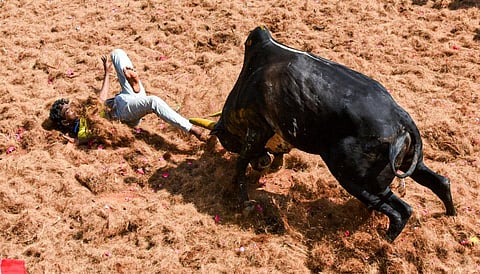

NEW DELHI: The Supreme Court on Thursday affirmed the amended laws that allow bull-taming sport jallikattu in Tamil Nadu, kambala in Karnataka and bullock cart races in Maharashtra taking note of the fact that the amended laws and rules “substantially minimise pain and suffering to animals.”
Taking note of the rules and notifications that have been implemented pursuant to the amended law, a five-judge bench of Justices KM Joseph, Ajay Rastogi, Aniruddha Bose, Hrishikesh Roy and CT Ravi Kumar directed for strict compliance of the same and also accorded the responsibility of their strict compliance on the competent authorities.
Reading the operative part of the verdict, Justice Aniruddha Bose on behalf of other judges said that the bench was satisfied with the materials placed on record that the sport was going on in TN for the last century but opined that the judiciary cannot undertake the exercise of determining whether this sport is a part of culture.
“We do not accept the view of Nagaraja that jallikattu is not a part of the cultural heritage of the State of TN. We do not think that there was sufficient material for the Court to come to that conclusion. We do not accept the view of Nagaraja that jallikattu is not a part of the cultural heritage of the State of TN. We do not think that there was sufficient material for the Court to come to that conclusion. In our opinion, TN Amendment Act does not go contrary to Articles 51A (g) and (j) and does not violate Articles 19 and 21 of the Constitution,” the court said.
The top court in 2018 had referred to a five-judge bench to decide whether the people of Tamil Nadu and Maharashtra could conserve jallikattu and bullock-cart races as their cultural right and demand their protection under Article 29 (1) of the Constitution.
The bench had then formulated five questions which were to be decided by the constitution bench, one of which was whether the 2017 jallikattu and bullock cart races laws of Tamil Nadu and Maharashtra subserved the objective of “prevention” of cruelty to animals under the Prevention of Cruelty to Animals Act of 1960.
It was argued by the petitioners that just because a group of citizens say it is part of culture, it cannot be said so. "Mere activity or an assertion cannot be said to be culture. Just because the legislature has adopted it,” Senior advocate Siddharth Luthra for the petitioners contended.
Senior advocate Shyam Divan has argued on behalf of the petitioners that the rules which regulated jalikattu were an “eyewash”.
Senior advocate Anand Grover, also speaking on behalf of the petitioners, argued that the right to dignity is accorded to animals but there were different levels to that. “You cannot depict the right to life of an animal without procedure established by law,” he added.
Defending the law, the State of Tamil Nadu had argued that the top court can suggest changes to the rules and standard of procedures (SOPs) but can not read down the law allowing bull-taming race jalikattu.
Contending that the laws permitting “kambala” in Karnataka were different from Jalikattu, the state of Karnataka has submitted that no law is violated in kambala.
“As far as the whipping of buffalo in kambala is concerned - we have amended 11(3) and added kambala and that to that extent permits whipping. They have alleged it is torturous. Now in the absence of any reports, data, etc --- that argument is unsustainable,” the counsel for the state submitted.
The state of Maharashtra told the court that the legislations seek to protect cultural practices and events which foster a spirit of sport and competition. “The bulls used for the races are not doing anything else but racing. The maximum permitted distance for racing is 1 km but in Maharashtra, the bulls are made to run only 100 to 200 metres. Bull race can be allowed in furtherance of culture and tradition and only with the permission of the District Collector. If these breeds of bulls aren't made to participate in races or if they are not looked after in a particular way, then they might die because they aren't made to pull carts,” Solicitor General Tushar Mehta submitted before the constitution bench on behalf of the Maharashtra government.